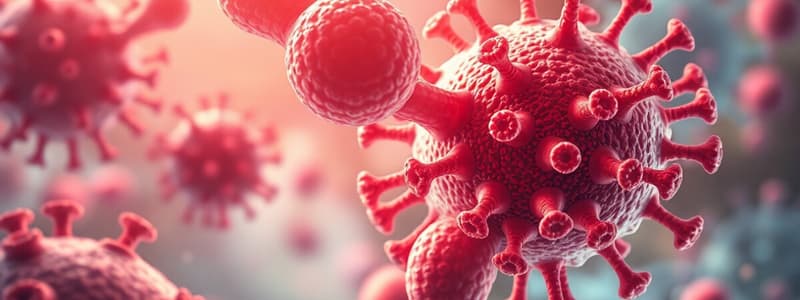Podcast
Questions and Answers
Which medication is classified as a drug that inhibits bacterial synthesis of DNA and RNA?
Which medication is classified as a drug that inhibits bacterial synthesis of DNA and RNA?
- Rifampin (correct)
- Trimethoprim
- Protease inhibitors
- Neuraminidase inhibitors
What do antimetabolites like trimethoprim and sulfonamides primarily affect in bacteria?
What do antimetabolites like trimethoprim and sulfonamides primarily affect in bacteria?
- Metabolic processes (correct)
- Protein synthesis
- DNA unwinding mechanisms
- RNA replication
How do many antiviral drugs work to inhibit viral replication?
How do many antiviral drugs work to inhibit viral replication?
- By disrupting protein synthesis
- By enhancing host immune response
- By targeting bacterial cell walls
- By inhibiting essential viral enzymes (correct)
Which of the following is true about fluoroquinolones?
Which of the following is true about fluoroquinolones?
Which of the following medications is NOT involved in disrupting bacterial synthesis?
Which of the following medications is NOT involved in disrupting bacterial synthesis?
What is the primary mechanism by which rifampin and metronidazole affect bacterial growth?
What is the primary mechanism by which rifampin and metronidazole affect bacterial growth?
Which of the following medications acts as an antimetabolite to hinder bacterial growth?
Which of the following medications acts as an antimetabolite to hinder bacterial growth?
Which enzyme is commonly targeted by drugs that suppress viral replication?
Which enzyme is commonly targeted by drugs that suppress viral replication?
Fluoroquinolones, such as ciprofloxacin, primarily disrupt which aspect of bacterial physiology?
Fluoroquinolones, such as ciprofloxacin, primarily disrupt which aspect of bacterial physiology?
Antimetabolites like sulfonamides affect bacterial growth by:
Antimetabolites like sulfonamides affect bacterial growth by:
What is the role of rifampin in bacterial treatment?
What is the role of rifampin in bacterial treatment?
Which mechanism do antimetabolites like trimethoprim primarily utilize to inhibit bacterial growth?
Which mechanism do antimetabolites like trimethoprim primarily utilize to inhibit bacterial growth?
How do fluoroquinolones like ciprofloxacin affect bacteria?
How do fluoroquinolones like ciprofloxacin affect bacteria?
What types of enzymes do antiviral drugs typically target to suppress viral replication?
What types of enzymes do antiviral drugs typically target to suppress viral replication?
Which outcome is expected when antimetabolites interfere with specific metabolic processes in bacteria?
Which outcome is expected when antimetabolites interfere with specific metabolic processes in bacteria?
What is the primary effect of medications like rifampin and metronidazole on bacteria?
What is the primary effect of medications like rifampin and metronidazole on bacteria?
Which of the following statements regarding antimetabolites is accurate?
Which of the following statements regarding antimetabolites is accurate?
What is the common mechanism employed by drugs that inhibit viral replication?
What is the common mechanism employed by drugs that inhibit viral replication?
Which of the following does NOT describe an action of fluoroquinolones?
Which of the following does NOT describe an action of fluoroquinolones?
What is the result of using antimetabolites like trimethoprim in bacterial treatment?
What is the result of using antimetabolites like trimethoprim in bacterial treatment?
How do fluoroquinolones affect bacterial replication?
How do fluoroquinolones affect bacterial replication?
What is the function of antimetabolites like trimethoprim?
What is the function of antimetabolites like trimethoprim?
Which of the following best describes a characteristic of drugs that suppress viral replication?
Which of the following best describes a characteristic of drugs that suppress viral replication?
What is a consequence of using medications like metronidazole on bacteria?
What is a consequence of using medications like metronidazole on bacteria?
Which statement about sulfonamides is accurate?
Which statement about sulfonamides is accurate?
What is the primary mechanism through which drugs like rifampin and metronidazole affect bacterial growth?
What is the primary mechanism through which drugs like rifampin and metronidazole affect bacterial growth?
What is a typical result of administering antimetabolites such as trimethoprim or sulfonamides in bacterial infection treatment?
What is a typical result of administering antimetabolites such as trimethoprim or sulfonamides in bacterial infection treatment?
Which enzyme is commonly targeted by antiviral drugs to prevent viral replication?
Which enzyme is commonly targeted by antiviral drugs to prevent viral replication?
What is a critical function of fluoroquinolones like ciprofloxacin in bacterial treatment?
What is a critical function of fluoroquinolones like ciprofloxacin in bacterial treatment?
How do drugs that suppress viral replication typically function?
How do drugs that suppress viral replication typically function?
What is the main outcome when drugs like rifampin and metronidazole are utilized in bacterial treatment?
What is the main outcome when drugs like rifampin and metronidazole are utilized in bacterial treatment?
Which of the following best describes the action of antimetabolites like trimethoprim and sulfonamides?
Which of the following best describes the action of antimetabolites like trimethoprim and sulfonamides?
What type of enzymes do drugs that suppress viral replication commonly target?
What type of enzymes do drugs that suppress viral replication commonly target?
What happens to bacterial growth when medications like trimethoprim and sulfonamides disrupt metabolic processes?
What happens to bacterial growth when medications like trimethoprim and sulfonamides disrupt metabolic processes?
Which medication class is associated with preventing bacterial DNA and RNA synthesis?
Which medication class is associated with preventing bacterial DNA and RNA synthesis?
Flashcards are hidden until you start studying
Study Notes
Drugs that Inhibit/Disrupt Bacterial Synthesis of DNA and RNA
- Rifampin, metronidazole, and fluoroquinolones (like ciprofloxacin) prevent or interfere with DNA and RNA production in bacteria.
- These drugs target bacterial processes involved in DNA and RNA synthesis, ultimately inhibiting bacterial replication.
Antimetabolites
- Trimethoprim and sulfonamides are examples of antimetabolites that interfere with specific bacterial metabolic processes.
- These drugs create dysfunctional metabolic products or reduce the production of essential metabolic products, hindering bacterial growth.
Drugs that Suppress Viral Replication
- Many antiviral drugs target enzymes essential for viral replication.
- These enzymes include DNA polymerase, reverse transcriptase, protease, integrase, and neuraminidase.
- By inhibiting these enzymes, antiviral drugs effectively suppress viral replication.
Drugs that Inhibit/Disrupt Bacterial Synthesis of DNA and RNA
- Rifampin, metronidazole, and fluoroquinolones (like ciprofloxacin) inhibit bacterial replication by targeting DNA and RNA production or interfering with their function.
Anitmetabolites
- Trimethoprim and sulfonamides disrupt bacterial metabolism, resulting in reduced growth or the production of dysfunctional metabolic products.
Drugs that Suppress Viral Replication
- Many antiviral drugs target viral replication by inhibiting enzymes crucial for viral replication, including:
- DNA polymerase
- Reverse transcriptase
- Protease
- Integrase
- Neuraminidase
Drugs that Inhibit/Disrupt Bacterial Synthesis of DNA and RNA
- Medications such as rifampin, metronidazole, and fluoroquinolones (like ciprofloxacin) hinder bacterial replication by interfering with DNA and RNA production or their functionality.
Antimetabolites
- Trimethoprim and sulfonamides are examples of antimetabolites. They disrupt bacterial metabolism by interfering with specific metabolic processes, leading to reduced or dysfunctional metabolic products.
Drugs that Suppress Viral Replication
- Specific viral enzymes, like DNA polymerase, reverse transcriptase, protease, integrase, and neuraminidase, are crucial for viral reproduction. Many antiviral medications target these enzymes to suppress viral replication.
Drugs that Inhibit/Disrupt Bacterial Synthesis of DNA and RNA
- Rifampin, metronidazole, and fluoroquinolones like ciprofloxacin are examples of medications that hinder bacterial replication by preventing or interfering with the production and function of DNA and RNA.
- These drugs target essential bacterial processes, disrupting their ability to copy and utilize genetic information.
Antimetabolites
- Trimethoprim and sulfonamides are antimetabolites that interfere with specific metabolic pathways within bacteria.
- By disrupting these essential processes, antimetabolites either reduce the production of necessary metabolites or generate dysfunctional products, ultimately hindering bacterial growth.
Drugs that Suppress Viral Replication
- Many antiviral medications target crucial enzymes required for viral replication, effectively inhibiting their ability to multiply.
- These enzymes include:
- DNA polymerase
- Reverse transcriptase
- Protease
- Integrase
- Neuraminidase
- By blocking these enzymes, antiviral medications disrupt the viral life cycle and limit their spread.
Drugs that Inhibit/Disrupt Bacterial Synthesis of DNA and RNA
- Rifampin, metronidazole, and fluoroquinolones prevent the production of DNA and RNA in bacteria
- These drugs also interfere with the operation of DNA and RNA, inhibiting bacterial replication
Antimetabolites
- Trimethoprim and sulfonamides interfere with specific bacterial metabolic processes
- These drugs reduce or create dysfunctional metabolic products, hindering bacterial growth
Drugs that Suppress Viral Replication
- Many drugs inhibit viral replication by targeting enzymes essential for viral replication:
- DNA polymerase
- Reverse transcriptase
- Protease
- Integrase
- Neuraminidase
Drugs that Inhibit/Disrupt Bacterial Synthesis of DNA and RNA
- Rifampin, metronidazole, and fluoroquinolones like ciprofloxacin target bacterial DNA and RNA production, effectively preventing bacterial replication.
- These drugs disrupt the function of bacterial nucleic acids.
Antimetabolites
- Trimethoprim and sulfonamides are examples of antimetabolites that interfere with specific metabolic processes in bacteria.
- These drugs create dysfunctional metabolic products, hindering bacterial growth.
Drugs that Suppress Viral Replication
- Many drugs target essential viral replication enzymes to suppress viral replication.
- These enzymes include DNA polymerase, reverse transcriptase, protease, integrase, and neuraminidase.
Drugs that Inhibit/Disrupt Bacterial Synthesis of DNA and RNA
- Rifampin, metronidazole, and fluoroquinolones like ciprofloxacin inhibit bacterial replication by interfering with DNA and RNA production or functionality.
- These drugs effectively target essential bacterial processes, leading to their inability to replicate.
Antimetabolites
- Trimethoprim and sulfonamides disrupt bacterial metabolic processes.
- These drugs interfere with the production of essential metabolic products, leading to impaired bacterial growth.
Drugs that Suppress Viral Replication
- Several antiviral medications target crucial enzymes for viral replication.
- These enzymes include DNA polymerase, reverse transcriptase, protease, integrase, and neuraminidase.
- Inhibiting these enzymes directly disrupts the viral replication cycle.
Studying That Suits You
Use AI to generate personalized quizzes and flashcards to suit your learning preferences.





